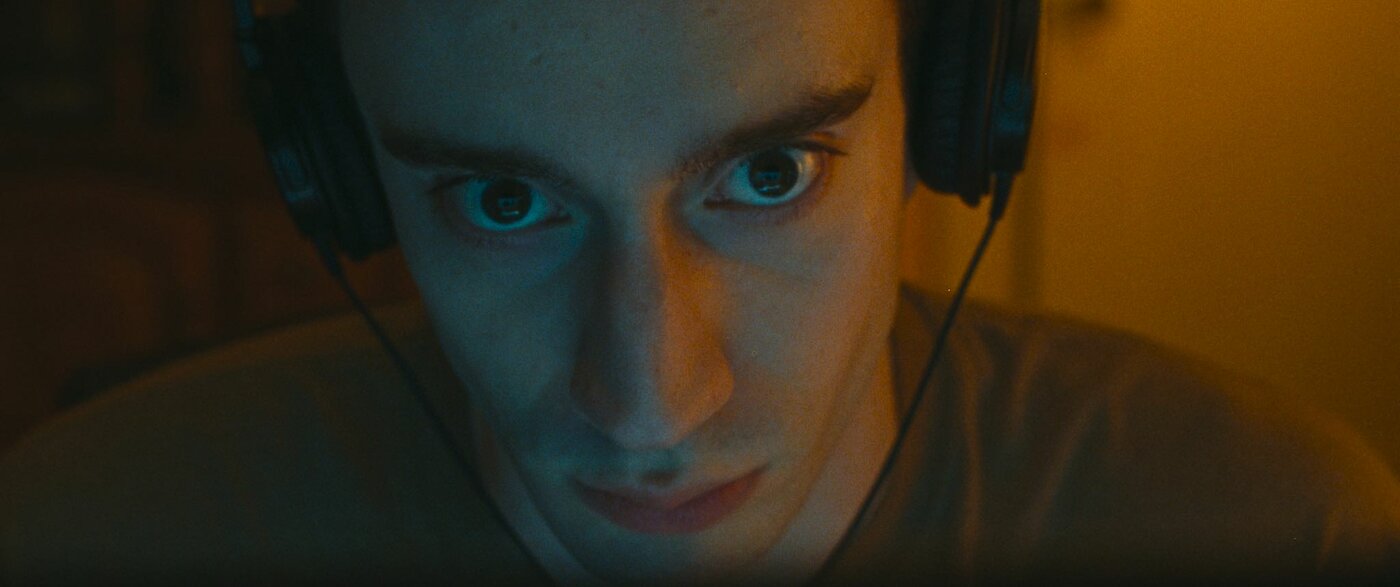
(NEXSTAR) — Alex Russell, the director behind Mubi’s latest theatrical release, “Lurker,” is best known for his writing and production on FX’s hit, “The Bear.” While that hot-blooded drama centers on one Chicago chef’s myopic obsession with building a successful restaurant, Russell’s directorial debut explores what happens when fandom, friendship and obsession coalesce into something even darker.
The film follows clothing store worker Matthew (Théodore Pellerin), a super-fan of rising British popstar Oliver (Archie Madekwe), who’s something like a mix between Frank Ocean and The Weeknd. After a chance encounter at Matthew’s store — where Matthew pretends he’s unaware who Oliver is — the store clerk, who lives at home with his grandmother, impresses Oliver with his music taste and earns an invitation to the artist’s show.
“I need a real person there,” Oliver tells Matthew, who quickly becomes one of Oliver’s inner-circle, with Oliver convinced his new friend is a tastemaker who will give him unfiltered insights.
Not everyone in Oliver’s world is taken with Matthew, however, whose need for validation and proximity to Oliver make him the target of suspicions almost immediately. Nevertheless, Matthew soon ensnares himself into the group by becoming Oliver’s documentarian. Through Matthew’s camcorder lenses, we, like Matthew, become enchanted with the young artist.
But Matthew soon overplays his hand and learns that the locks into Oliver’s world can be easily changed.
The acidic and ruthless script, also written by Russell, has already drawn (and will undoubtedly draw more) comparisons to Patricia Highsmith’s “The Talented Mr. Ripley,” in addition to its cinephile-favorite 1999 film adaptation directed by Anthony Minghella. While influences of Highsmith’s framework exist in the story’s bones, Russell’s film diverts from the formula in a surprising, and perhaps more disturbing, way. Also, Matthew isn’t nearly in the same class of social climbing obsessives as Tom Ripley. Call him the un-talented Mr. Ripley.
The film’s greatest strengths lie in its direction, cinematography and leading performance by Pellerin.
As the elusive Matthew, whom viewers will ultimately know very little about, Pellerin haunts every scene with a carefully calculated blankness. The performance isn’t blank, though. While Matthew is uncomfortable to watch, Pellerin still manages charisma through the cringe. It’s a sly feat making someone this off-putting somehow also alluring but “Lurker” wouldn’t work if we weren’t fascinated by its unknowable protagonist.
We’d also be remiss not to mention the insular but captivating presence of Oliver. The young artist is surely less chatty or desperate than Matthew and Madekwe (“Saltburn,” which this film also has been compared to) does exquisite work of saying everything through stares, or else, from looking away. Like Matthew, there’s an unknowability of Oliver, as viewers will get the sense that Oliver himself is keeping parts of himself away from everyone — though maybe not Matthew.
Russell’s direction, meanwhile, accentuates the discomfort, with the film lingering in awkward scenes longer than expected or toying with jarring tonal shifts. But Russell also lets scenes breathe in equal measure when we experience Oliver through Matthew’s eyes, and viewers will be equally as drawn into Matthew’s possessive gaze. As Matthew records video after video of Oliver, we too understand the spell being cast by Oliver (and Madekwe). Elsewhere, sharp cuts, integration with technology, and some terrific scene framing give “Lurker” a well-developed sense of aesthetic identity.
Helping to flesh this out is cinematography by Pat Scola (“Sing Sing”), which imbues the film with a tactile reality that flirts with hypnosis. A gorgeous but gritty film grain juxtaposes vibrance, creating an atmosphere that perfectly encapsulates the film, which itself teeters between a feeling of a dream coming true and a nightmare brought to life.

Finally, “Lurker” features a vast and gorgeous musicscape. Kenneth Blume‘s “Lurker” score throbs, drones and flourishes through the film with an electronic, clubby sensibility, and feels authentically “now.” In a movie like this, it’s important for the fictional artist’s songs to feel like they could actually be popular and the movie’s original songs, sung by Madekwe and produced by Blume, feel like something Dominic Fike could conceivably release. Side note: Is it too late for “Domicile” to be song of the summer?
All-in-all, “Lurker” is a fun (and unnerving) thriller that will sit with you after credits roll. It feels accomplished and confident and hints at even greater films to come from an exciting new stylist. We’re obsessed.
“Lurker” is in theaters nationwide now.
Score: ★★★★☆

